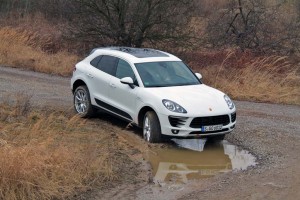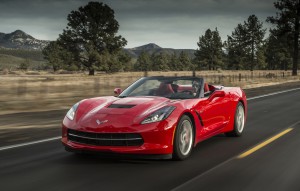
The Porsche Macan is the most-loved car in the U.S., according to a new survey from Strategic Vision.
Bo Diddley and later George Thorogood have both asked the question, “Who do you love?” but nowadays automakers want to know “What do you love” and who’s doing lovin’?
According to a new study, Gen Y is surprisingly the strongest lovers of their cars with the Porsche Macan engendering the strongest feelings.
Strategic Vision’s newly created Customer Love Index (CLI) is tracking automotive amore to see what consumer segment has the strongest attachment to vehicles and then, of course, scoring what vehicles are most loved.
For all of the hubbub in recent years about millennials and how their supposed ambivalence about cars may spell the demise for the auto industry, it was that group that shows the most love for vehicles.
CLI shows a staggering difference between millennials, who give an average CLI score of 470, and the rest of the industry, which gives an average score of about 400. Not only are their scores higher, but also millennials are much more likely to be buying mass-market vehicles designed to maximize value, not love. Essentially, they love their compact hatchbacks so much that they rate them similarly as owners of luxury convertibles, according to Strategic Vision.

The latest version of Chevy's Corvette Stingray can get up to 31 mpg while making 455-hp, which helps to make it the second-most loved vehicle.
That loyalty and devotion to what they like pushed some vehicles, such as the Infinity QX80 and Range Rover Evoque to the tops of their respective segments.
“As new younger buyers enter any market they essentially crush hard on their choices, believing that their first love will always be their only,” reports Christopher Chaney, Senior Vice President of Strategic Vision.
(NHTSA delays “quiet car” EV ruling. For more, Click Here.)
“Of course, this isn’t new to millennials. Every generation in their youth can remember their first love and the deep emotional impact it had on their lives, and future decisions in life.”
What may be surprising is that the brand that generated the most affection? Volkswagen. Of course, the survey results were collected before the diesel scandal hit the U.S. so there will likely be repercussions for that.
“When trust is violated, love is diminished,” the company noted. “The good news for VWGoA is that they will be working from a position where customers have initially loved their experience. When love is lost, that’s when the real work begins.”
Strategic Vision secured responses from more than 44,000 new vehicle owners in dozens of categories. The top 10 vehicles by overall score were:
- Porsche Macan (629)
- Chevrolet Corvette Convertible (617)
- Chevrolet Corvette Coupe (598)
- Ford Mustang Convertible (564)
- Mercedes-Benz CLA A-Class (564)
- Mercedes-Benz S-Class Sedan (563)
- Mini Cooper Hardtop (547)
- Dodge Charger (543)
- Infiniti QX80 (524)
- Land Rover Range Rover Evoque (516)
The scores are an indication of the level of infatuation the owner has with the vehicle. Love for speedy cars isn’t surprising, but some may wonder why no hybrids or EVs made the top 10. It’s simple really: they don’t love their vehicles as much.
(Click Here for details about Toyota’s second recall of 1.6 million vehicles with Takata airbags.)
Research shows that hybrid owners are not in love with their vehicles as much as some think, and the sales numbers tend to support this. Hybrid vehicles are billed as innovative and great for both your wallet (via MPG) and planet Earth.
However, they don’t receive the same level of approval as other highly disparaged vehicles: minivans. Often characterized as being bland, boring, and completely uncool, minvians obtain higher CLI scores than most hybrid vehicles.
No matter the fuel type, a vehicle must first address the values and priorities of the customer. Although hybrid vehicles satisfy the needs of owners in having an environmentally friendly vehicle, most hybrid and many electric vehicles fail to generate enough love to stay viable in the future, because they only satisfy “professed” (MPG) long-term financial benefits or emissions-environmental factors.
Focusing on the right product enhancements and messaging, however, these Alternative Powertrain vehicles have the potential to sell at much higher rates even if they have higher prices.
For example, the Toyota Prius models has dominated this sales space not because of being among the first to market, but because of the love customers have for its unique exterior styling and interior innovations such as the instrument panel, and how it displays information at a luxury segment level.
(To see more about why makers are expecting November record auto sales, Click Here.)
“Most U.S. customers will not spend more than an additional $50 per month for a vehicle just for MPG enhancing or environmentally friendly powertrain. Instead, creating a product that customers can love will allow buyers to spend significantly more money because it has the right balance of styling, innovation, performance and environmental friendliness,” said Alexander Edwards, president of Strategic Vision.
